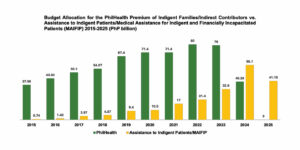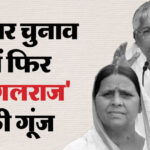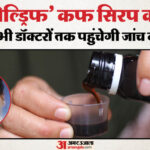
TakeFWith no other means to pay his father's mounting hospital bills, Ozan, a BPO (Business Process Outsourcing) worker, found himself in a line at a local government office with medical records and proof of poverty in hand. She left her father at the hospital, desperate and scared, knowing that every minute he spent with her could be his last. Yet, instead of being with him, she was in a politician's office, forced to endure long queues for medical assistance that could have extended her father's life.
After all the humiliation, he only got a few hundred pesos. He was even asked to post a Facebook photo thanking the politician. His father died soon after.
Ozan shared this frustrating and terrifying experience during a press conference,, Calling for an end to patronage-driven and rights-based health budgets. His story is not an isolated case; This reflects the reality faced by millions of Filipinos suffering from diseases and plagued by devastating health expenditures.
It appears that, for the poor, getting healthcare in the Philippines is now a complete circus. It appears that poor patients have to go through an obstacle course, in which one challenge is to beg a politician for a letter of guarantee, also known as a “GL”. For others who have no one to process their papers, medical treatment is waived. They resort to self-treatment. Or they die tragically without even seeing a doctor.
Some patients have had their applications for medical aid rejected after being forced to move to private hospitals due to overcrowded public hospitals that could not provide them care.
It is an indecent, abusive and, in some cases, deadly health financing system. It supports patronage-driven medical assistance programs rather than an institutional program that provides assistance directly to patients. This is slowly and worryingly becoming the norm. It serves as the new face of the Pork Barrel Fund. This keeps people dependent on politicians, as aid has to pass through political gates before reaching patients.
Standing between a patient and the assistance they desperately need to survive, the politician plays the role of a “savior”, as if the funds to be distributed come straight from their pockets and not from the national treasury built by the sweat and blood of every Filipino.
What is even more brutal is that this type of health-related Help (AID) Deliberately undermining PhilHealth and universal healthcare. The Universal Health Care (UHC) Act is an institution to ensure rights-based provision of medical aid.
Under the UHC Act, the Philippine Health Insurance Corporation (PhilHealth) is mandated to provide coverage for all Filipinos through the National Health Insurance Program, ensuring equitable access to quality and affordable health care. The law is designed to pool funds from various sources, making PhilHealth the sole purchaser of individual health services.
Every Filipino's membership in PhilHealth entitles him to protection from financial hardship. This means that the patient and his family members no longer need to leave their hospital beds to visit various government offices or politicians and collect financial assistance.
PhilHealth is being destroyed. While the PhilHealth budget was apparently slashed to zero in 2025, the patronage-driven Medical Assistance for the Poor and Financially Disabled Patients (MAIFIP) received a surprise funding of P41.15 billion.
The reduction in funding to PhilHealth coupled with the increase in funding for patients' MAIFIP reflects the government's lack of appreciation for the essential role of social health insurance in achieving UHC.
For power-hungry, credit-seeking traditional politicians or traposMAIFIP is better than PhilHealth and UHC. PhilHealth benefits do not contain the names of politicians promoted or advertised. The profits cannot be attributed to the patronage of politicians.
Over the past decade, there has been a steady trend of increased budget allocations to assist poor patients, which later came to be known as MAIFIP. Historical budget data indicate a reduction in PhilHealth funding as well as a worrying increase in medical aid funding, especially evident during the recent midterm election campaign season under the Marcos administration.
Same situation is going to arise for the budget of 2026 also. The House of Representatives is allocating a total of P49 billion to MAIFIP in the General Appropriations Bill (GAB), doubling the executive's proposed budget of P24 billion. For aid that Congress hopes will reach only 1.27 million Filipinos compared to PhilHealth's 26.15 million poor patients, such misallocation comes as a shock.
trapos MAIFIP is presented as charity, but in reality it forces people to beg. It depends on political discretion, and it is completely uneven. The distribution of medical aid under this program depends entirely on the will of the politician. Who receives aid and how much is given is left up to the personal discretion of the politician, inevitably leading to selective beneficiaries being rewarded while many others are left with nothing.
Dr. Antonio L. According to Danes, 2022 National Demographic and Health Survey data reveals a worrying situation: Discretionary health funding disproportionately benefits the better-off. Only 12% of these funds reach the poorest Filipinos, while 43% goes to the richest two quintiles. This distribution is contrary to the expectation of MAIFIP – to provide financial assistance to those who are “indigent and economically challenged.” Rather than serving as a safety net for the poor in times of insecurity, medical assistance through MAIFIP disproportionately favors only those favored by political patrons.
The Filipino people are entitled to the right to health. No Filipino should be forced to beg or be burdened with utang na lub It turns his suffering into a debt that must be repaid through political loyalty.
Prioritizing MAIFIP over PhilHealth is a betrayal of public service. This is disgusting and inhumane.
,The live stream of the press conference on October 3 can be watched again here: https://www.facebook.com/BawasBisyo/videos/756564470671500/?rdid=uPD34DaLYYxbHyhL#
Delin Dela Cruz and Rosheik Sims are researchers and communicators on the fiscal and health policy team at Action for Economic Reforms (AER).










